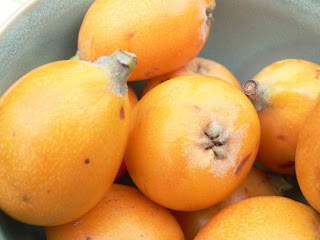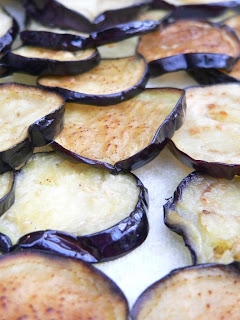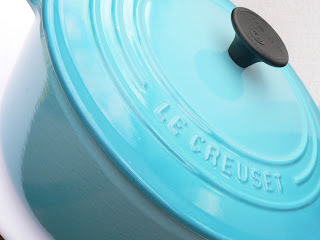 What’s the definition of an optimist? Someone who digs out her copy of Elizabeth David’s Summer Cooking as soon as the thermometer flirts with anything over 15°C. This weekend, I leafed through my old copy, with its stained pages and broken spine, my name written territorially on the title page. I bought it the summer I graduated, when the world was opening up before me, full of delicious possibilities.
What’s the definition of an optimist? Someone who digs out her copy of Elizabeth David’s Summer Cooking as soon as the thermometer flirts with anything over 15°C. This weekend, I leafed through my old copy, with its stained pages and broken spine, my name written territorially on the title page. I bought it the summer I graduated, when the world was opening up before me, full of delicious possibilities. 
That summer, I shared a first floor flat in a large Edwardian terraced house with three boys. Every second Saturday, I trotted down the stairs to the flat below to give our rent to the elderly son-in-law of the entirely ancient lady who owned the building. He looked exactly like Freud. He even spoke with a refined though pronounced Austrian accent. This would not have been quite so disconcerting had the room in which the transaction took place not resembled so closely the study in the Freud Museum just up the road, complete with antique rugs, heavy wooden furniture and strange little bibelots of mysterious origin and sexuality. I was never quite sure if I should hand over the cash right away or lie down on the sofa and tell him a bit about my childhood first.
Our kitchen was so tiny and prone to condensation that, summer and winter, we had to push open the large sash window every time we wanted to do anything more extravagant that make tea. Still, we managed to throw some great parties, tossing the key down on a string from that same window to our visitors below to save ourselves the trouble of the many stairs. One hot August night, I lay in bed listening to the sounds drifting up through my window from neighbouring houses. Soft laughter, the clack clack clack of a type writer and Miles Davis’ Sketches of Spain being played over and over again – fresh from a tiny Scottish university, I thought I was living in the height of bohemian splendour.
Since then, this tatty book has travelled with me from a Moscow tower block to summer rentals in the Languedoc, as well as across several London postcodes. It’s been packed away and then hastily unpacked in increasingly large and better-ventilated kitchens. We’re friends. We have history. We can not talk for months, years even, but when we get back together it’s as though we’ve never been apart, fish kebabs, crab soup, omelette aux fines herbes and apricot ice cream, our lingua franca.
So I was surprised to discover a recipe I hadn’t noticed before, one for Maqlub, the Persian aubergine and rice dish more frequently called maqluba or makloubeh. Its name means ‘upside down’ and truthfully, that’s the only tricky part of making this fragrant and lovely dish – inverting the hot casserole requires a cool head and sturdy oven gloves.
 I went to the Turkish Food Centre on Ridley Road to buy my ingredients. I love it there, tucked away behind the market. It’s like being on holiday (without the sadistically small baggage allowance), with aisle upon aisle of intriguing ingredients and some of the cheapest, freshest produce in London. I always end up buying more than I’d planned. I may go in for a jar of tahini, but I’ll come out with rose petal jam, some marinated olives, a packet of sumac, honeycomb, a pot of lebneh, a loaf of pillowy, still-warm flat bread, huge bunches of herbs... Yesterday, I was quite restrained, restricting myself to things for the maqlub, some fresh green almonds and a few loquats to nibble for breakfast. I was very proud that I managed to swerve the vine leaf press, a slab of earthenware with holes in it I imagine intended to keep dolma from unfurling while they’re cooking. But I’ve been thinking about it all afternoon.
I went to the Turkish Food Centre on Ridley Road to buy my ingredients. I love it there, tucked away behind the market. It’s like being on holiday (without the sadistically small baggage allowance), with aisle upon aisle of intriguing ingredients and some of the cheapest, freshest produce in London. I always end up buying more than I’d planned. I may go in for a jar of tahini, but I’ll come out with rose petal jam, some marinated olives, a packet of sumac, honeycomb, a pot of lebneh, a loaf of pillowy, still-warm flat bread, huge bunches of herbs... Yesterday, I was quite restrained, restricting myself to things for the maqlub, some fresh green almonds and a few loquats to nibble for breakfast. I was very proud that I managed to swerve the vine leaf press, a slab of earthenware with holes in it I imagine intended to keep dolma from unfurling while they’re cooking. But I’ve been thinking about it all afternoon. 
Maqlub
Elizabeth David wrote: ‘Although this is rather a trouble to make it is one of the best of all aubergine dishes, and the rice, which has absorbed some of the flavour of the meat, is particularly good. A good bowl of yoghourt can be served with it, and a tomato or green salad.’

I’m giving you this recipe as Elizabeth David wrote it, apart from converting it to metric and making some small details of technique more explicit. When I make it again, I might make a few very small adjustments based upon what I’ve read about maqlub since I made it. I might try making the first layer out of sliced tomatoes and I’d definitely brown the mince in the pan once I’ve finishing frying the onions. Elizabeth David suggests you can use raw or cooked meat and I used raw, which clumped up a bit in the cooking process. I think cooked lamb would combine more seductively with the whole dish. I might add a little more seasoning, a pinch or two of cinnamon and nutmeg and a few grinds of black pepper to the meat, and I might toss a few toasted almonds over the top with the parsley.
4 medium-sized aubergines
600g minced lamb or mutton, cooked or raw
200g of rice, I used basmati but any long-grain rice will do
1 onion, finely sliced
2 cloves of garlic, finely chopped
50g flaked almonds
½ tsp ground allspice
400ml beef stock
1tsp of finely chopped thyme leaves or marjoram
Olive oil for frying – not extra virgin
Parsley, finely chopped, for garnishing
Cut the unpeeled aubergines into 6mm slices, sprinkle them with salt and leave them for an hour. Put the rice into soak in water for an hour. Mix the allspice, thyme or marjoram and garlic with the meat. Rinse and dry the aubergines. Heat about 1cm of oil over a medium-high heat and fry the aubergines on both sides until just starting to turn golden. When you have finished frying the aubergines, fry the onions until soft and translucent.
Brush a round casserole lightly with oil. Put a layer of the fried aubergines into the bottom of the casserole (I used a third, so I would end up with three layers), sprinkle on a layer of meat.
 Sprinkle with a few blanched almonds and a third of the onions. Repeat until all of the aubergines and meat are used up, and on top put the drained rice. Pour over half of the stock, cover the dish and cook over a low heat for about 20 minutes. Add the rest of the stock and cook for another 30-40 minutes until the rice is almost cooked. Preheat the oven to 180ºC/350ºF/Gas mark 4.
Sprinkle with a few blanched almonds and a third of the onions. Repeat until all of the aubergines and meat are used up, and on top put the drained rice. Pour over half of the stock, cover the dish and cook over a low heat for about 20 minutes. Add the rest of the stock and cook for another 30-40 minutes until the rice is almost cooked. Preheat the oven to 180ºC/350ºF/Gas mark 4. Put an ovenproof serving dish or plate over the pan, carefully turn out the contents of the casserole and put into the oven for another 10-15 minutes. The rice will finish cooking and any liquid left will be absorbed.
We ate it with a few peeled, deseeded and sliced cucumbers tossed in yoghurt with a pinch of sea salt and chopped mint. I trickled a little good olive oil over it just before serving.

TIP
Aubergines. Do you salt them or not? In the past, they were always salted to remove any bitterness and some of their moisture, but with modern varieties it’s not really necessary. I only salt them when I’m going to fry them, as in this recipe, so they don’t soak up quite so much oil – though, be warned, they do still soak it up as keenly as a drunk in a bar five minutes before closing.
LICKED

I love Steenberg’s spices, a fantastically extensive range of organic, often Fairtrade seasonings sourced and sold by Axel and Sophie Steenberg in North Yorkshire. They now stock chocolate, vanilla, tea and coffee too.

I was not an original bride. I did my best to convince Sean that our marriage licence would not be valid without being able to show proof of ownership of at least three Le Creuset casseroles. Nearly 12 years later they’re still going strong. Despite being shamefully overworked and sometimes being the object of much incendiary abuse, they’re still perfect - the same might be said for Sean.
Gosh Debora - what a fabulous post! I saw a show on Elizabeth David a few months ago. Very interesting life she had I must say.
ReplyDeleteI love your "history" with her book. It's amazing how "old" things become more meaningful and valuable as one gets older.
I must add I have never heard of Maqlub. And given the number of mediterranean books I own this is extraordinary. When I am next feeling Herculean I will experiment!
I have to say I never salt eggplant anymore and I didn't know they soaked up less oil that way. I must admit I use a ton of paper towelling when I shallow fry them. My neighbour recommended grilling, but I'm scared to try because I fear they will shrivel up!
One last thing - I'm having trouble believing that beautiful Le Creuset is overworked! It looks so new.
Hello Mariana,
ReplyDeleteWas the show you saw 'Elizabeth David: A life in recipes', the film about her life? If so, I saw it too and thought it was very good. The images of food were beautiful, so evocative they made you want to press pause and rush straight for the stove.
Don't be put off from making the maqlub by all of the stages. It does take a little time but it's all very simple. It's perfect for those days when you facy pottering around in the kitchen for a couple of hours. That's one of the things I love about cooking - you look busy, too busy to distract with the mundanities of life such as picking up dry cleaning or going to the bank, but really you're in a semi-hypnotic state of bliss.
I do grill aubergines on the barbecue, especially when I'm making Italian roll-ups, involtini, but then they're cut lengthways and are less likely to burn!
Oh, and well done, detective. The Le Creuset pictured here is a more recent addition, a couple of years old, and I used it here because I thought that lovely blue looked a little Persian. But I promise, my older ones are in just as good nick! Stick around, I'm sure they'll show up sooner or later...
This looks wonderful. A Persian friend of mine advised me to soak aubergines in milk before frying so they don't absorb as much oil.
ReplyDeleteThank you Catherine. I'm very interested in the milk tip. I've heard of soaking them in salted water before, but never in milk. I'll give it a try.
ReplyDeleteYes I think it was that film Debora and yes "evocative" it was. I felt sorry for her when she lost her "soulmate".
ReplyDeleteThanks for the grill tip. I shall try that next time.
I'm very curious about Catherine's tip. And if the advice came from a Persian then it must be true, mustn't it?
Elizabeth David is a cool life model!
ReplyDeleteAs well as changing the face of British cooking after WW2, just before the war she sailed through France, down rivers and canals, to the Mediterranean (cooking and noting as she went) with a lover, only to be caught out by the declaration of war and was interned by the Italians. (I think it was the Italians).
There is a lovely photo of her in one of her biographies, cooking over a tiny cooker in her tiny flat in London, her eyes narrowed against her own cigarette smoke, a cigarette dangling in her hand. This wouldn't happen now, would it?
I know, I know, Debora - interested in the life not the cooking...
Sorry
W xxx
Mariana - yes, she certainly had a dramatic and eventful life. But without her inherent restlessness, she wouldn't have gathered such an awe-inspiring collection of recipes. In this country at least, she changed the way we cook forever.
ReplyDeleteWendy - I hold out hope that one day I can win you over to the recipes as well as the stories!
Dx
oh this is such a lovely story! the meal looks deleicious too :)
ReplyDeleteThank you La Fée - I hope you make it yourself at some point. It really is good.
ReplyDeleteI have been thinking of this dish and recipe book all yesterday after reading your post - thanks for visiting the wee creative blog - and hope the dinner goes well - pizza! Girlfriend, you could make saltines and a can of tomato soup taste good!
ReplyDeleteOh, Lady P, you are too kind! You know that vine leaf press I talk about in my post? I've been thinking about THAT all day. I really want to go and buy it and make dolma and perhaps labneh balls for canapés on Sunday...and as Oscar Wilde so famously said, 'I can resist everything except temptation'.
ReplyDeleteI've GOT to check this out!
ReplyDeleteRebekka - DO!I'm sure you won't regret it. Let me know how you get on.
ReplyDeleteThat looks so great!and thanks baking is the best!
ReplyDeleteMmmn yum! Reluctant cook that I am I may be forced to try this Debora. On the other hand I could just wait and hope someone cooks it for me in France!
ReplyDeleteSummer Cooking was the first cookbook I ever owned - this lovely piece took me tumbling back to the days when I began to discover that food could be simple, elegant, exciting and taste good, all at once. I loved Elizabeth David's writing: her whole exotic take on food.(I had endured a lot of Sunday roasts with grey meat and soggy veg up until then - although to be fair my grandmother's blackcurrant tart and clotted cream, was and has remained, unsurpassed)The conjuring up of a summer picnic especially, seemed to me a thing of wonder and beauty. So much so that I was inspired, in those undergraduate days, to attempt picnics, a la David, to be eaten in June on the banks of the Cam - happy days. I'm going off to my bookshelves now to track down my copy.The sun is shining and I can feel a picnic coming on... Ax
Avril, That's why I love Elizabeth David recipes, their confident simplicity which allows the ingredients to shine. I LOVE the idea of your grandmother's blackcurrant tart with clotted cream. I'm planting blackcurrant bushes this year, so just such a tart might be in my future. I hope you have a lovely picnic, and a wonderful Easter.
ReplyDeleteDx